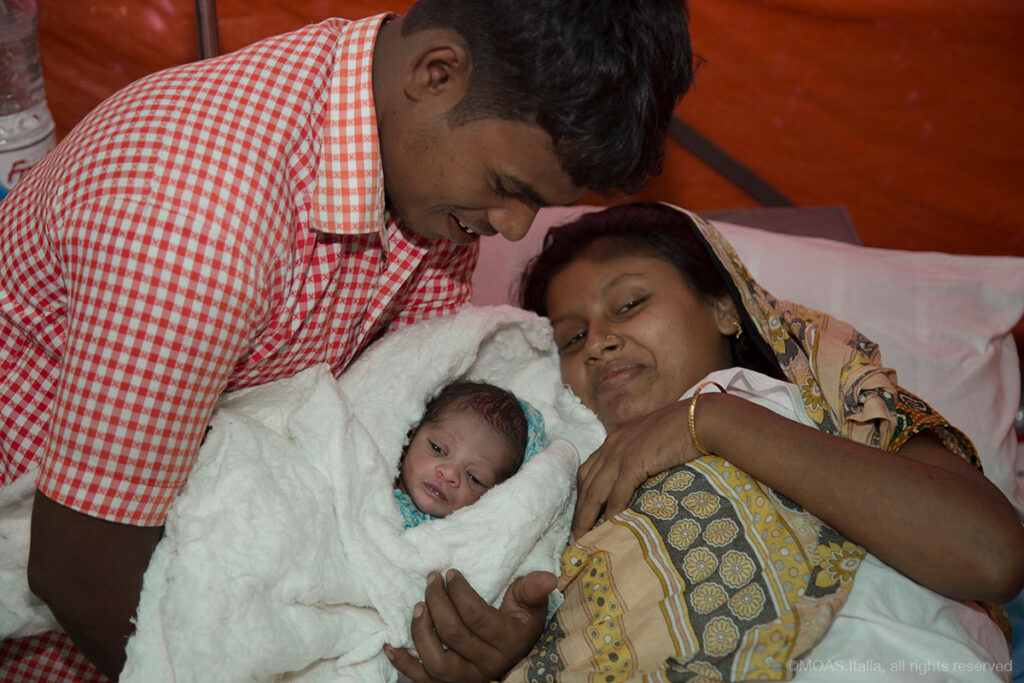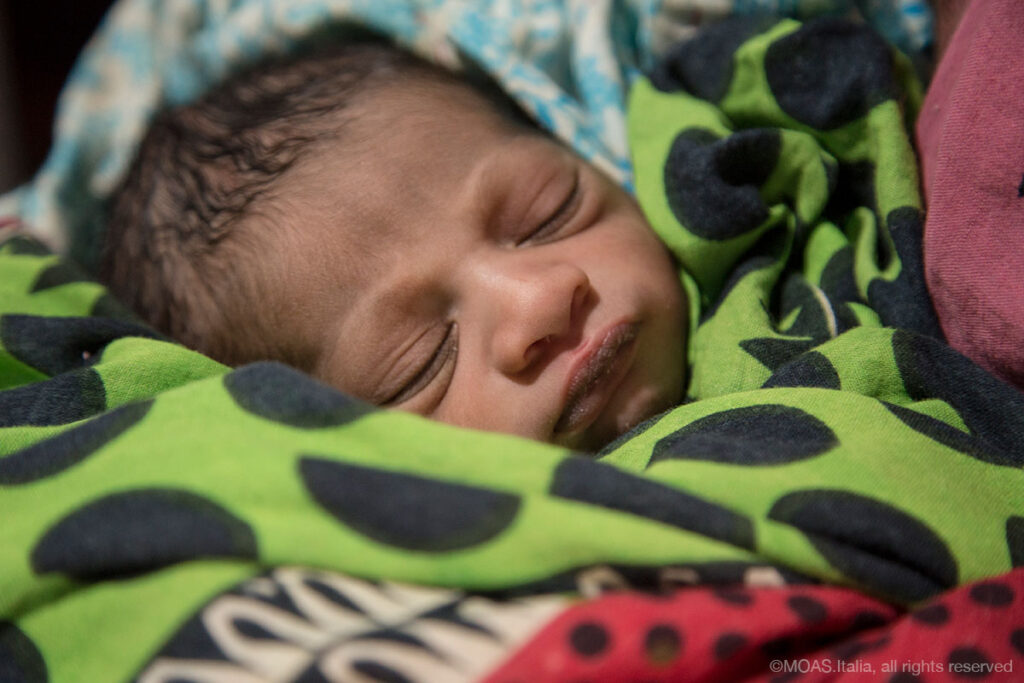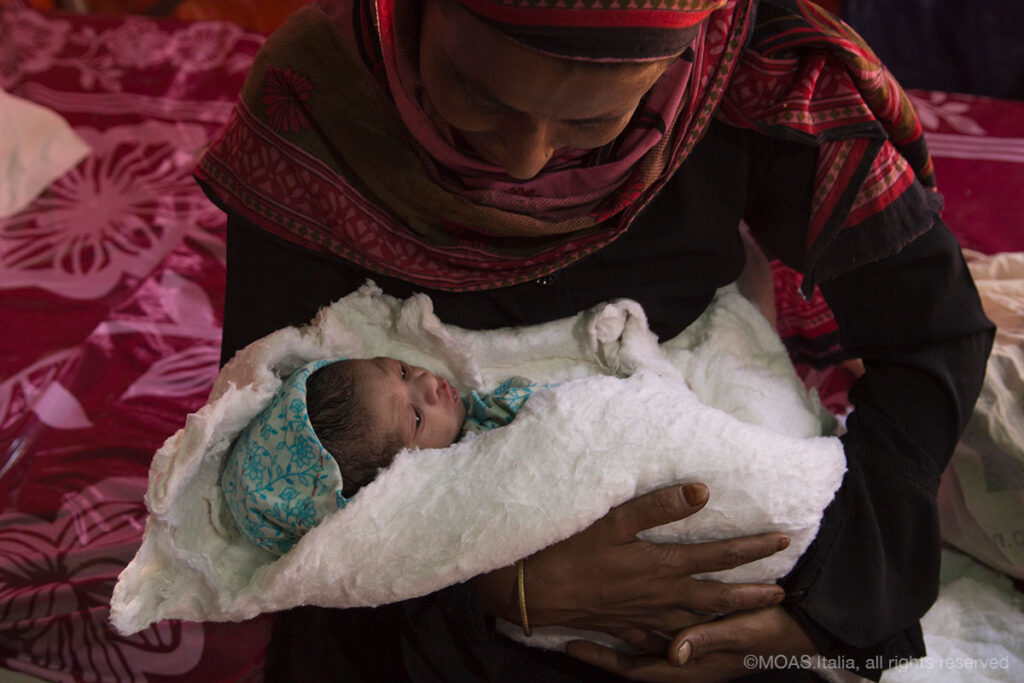When the MOAS medical team moved into Bangladesh to begin delivering medical aid to local populations and the Rohingya refugees arriving from Myanmar, we knew it would require a focus on maternal health and paediatrics. The refugee population is made up of 60% children, and with over 55,000 pregnant and lactating women officially registered – and more unregistered within the community – it was only a matter of time before the MOAS medical team started delivering babies.
MOAS currently sees an average of 20 new pregnancy cases per week at each field hospital, most of whom have never seen a doctor for pre-natal care and advice, making each consultation uniquely challenging and delicate. Deliveries in this context are not only made difficult by this lack of prenatal care but also by the environmental factors present. Incidences of violence while pregnant, lack of access to proper nutrition, limited access to general healthcare, long distances travelled and exposure to high levels of stress during pregnancy are all vulnerability criteria when dealing with deliveries within refugee communities like this one. It is for these many reasons that MOAS has invested widely in preparing to care for these women.
Based on the above needs assessment, a separated maternity room exists in each MOAS Aid Station, providing privacy and dignity to the women and their families. These maternity rooms are serviced by a midwife and an OBGYN, each of whom are highly qualified and with years of experience. This means that women visiting any MOAS clinic receive specialist care from field professionals in as protected and caring an environment as possible.
On Sunday 12th November, this preparation was put to the test when the MOAS team delivered their first baby at the Shamlapur Aid Station. The baby was born to Nurunnahar and Shafiul, a Rohingya couple who were born in Banglaesh in the Notunpara community in Shamlapur to refugee parents. They came to the Aid Station in the mid-morning and the MOAS medical team sprang into action. The family were monitored as labour progressed over the course of the coming hours. The MOAS Medical Lead was on hand to oversee treatment and assess the situation should Nurunnahar need to be transferred to the local hospital in the MOAS ambulance in case of complications. Thankfully, this was not needed and, through the diligent care and guidance of the MOAS medical team, a healthy baby boy was born to the happy couple at 13h local time.
Speaking to Dr Giada Bellanca after the delivery, she said: “We are all absolutely delighted that our preparation and planning allowed our first delivery at a MOAS Aid Station to go so smoothly. I am grateful to our team for their good work and we are wishing the family all the very best for the future.” Shafiul, who works at a local shop in the Bazar, told us how relieved and delighted he was to see his newborn son and wife in perfect condition after delivery and how excited he is to introduce the new addition to the community. The family will, of course, be checked in the coming days and weeks at the Aid Station to monitor the progress of both mother and baby. We look forward to many more successful births at the Aid Stations but acknowledge that, given the dire conditions in which the mothers are gestating, each healthy baby born will be testament to the resilience of the mothers and the skills of the MOAS team.
Shafiul, who works at a local shop in the Bazar, told us how relieved and delighted he was to see his newborn son and wife in perfect condition after delivery and how excited he is to introduce the new addition to the community. The family will, of course, be checked in the coming days and weeks at the Aid Station to monitor the progress of both mother and baby. We look forward to many more successful births at the Aid Stations but acknowledge that, given the dire conditions in which the mothers are gestating, each healthy baby born will be testament to the resilience of the mothers and the skills of the MOAS team.
If you are interested in supporting MOAS’ work, please give what you can on www.moas.eu/donate or consider becoming a fundraising activist on www.moasfundraising.com. Spread the word about our work by sharing our stories on social media and sign up to our newsletter for regular updates.


